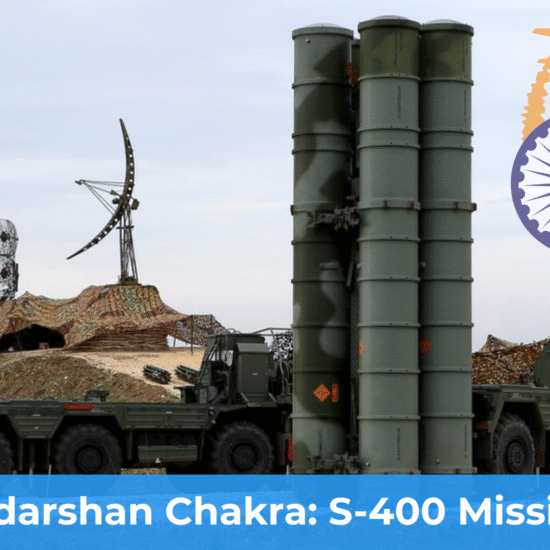Operation Sindoor: India’s Precision Strike Against Terrorism in Pakistan and PoJK
Why in News?

On May 7, 2025, the Government of India launched Operation Sindoor, a decisive and coordinated military response to the April 22 Pahalgam terror attack, which claimed the lives of 26 civilians, including 25 Indians and one Nepali tourist. The attack, claimed by The Resistance Front (TRF)—a proxy of Lashkar-e-Taiba (LeT)—prompted India to strike back, targeting nine terror infrastructure sites located in Pakistan and Pakistan-occupied Jammu and Kashmir (PoJK).
Operation Sindoor: A Coordinated Tri-Force Offensive
Operation Sindoor was executed with precision and restraint, involving the Indian Army, Navy, and Air Force in a joint effort launched entirely from Indian territory. The strikes targeted facilities associated with Jaish-e-Mohammed (JeM), Lashkar-e-Taiba (LeT), and Hizbul Mujahideen, all long-standing threats to Indian national security.
What sets Operation Sindoor apart from previous military offensives is its symbolic naming. Unlike past operations with overtly aggressive nomenclature, “Sindoor” was chosen to honour the victims, especially the widows of the Pahalgam attack, making it a tribute of remembrance and resolve rather than mere retaliation.
Terror Sites Targeted Under Operation Sindoor
Below is the list of terror-linked sites destroyed during Operation Sindoor:
| Location | Function / Affiliation |
|---|---|
| Markaz Subhan Allah, Bahawalpur | Jaish-e-Mohammed Headquarters |
| Markaz Taiba, Muridke | Lashkar-e-Taiba Base |
| Mehmoona Joya, Sialkot | Hizbul Mujahideen Camp |
| Markaz Ahle Hadith, Barnala | LeT-linked Religious Indoctrination Hub |
| Syedna Bilal Camp, Muzaffarabad | Jaish-e-Mohammed Training Centre |
| Shwawai Nalla Camp, Muzaffarabad | Lashkar-e-Taiba Operations Unit |
| Makaz Raheel Shahid, Kotli | Hizbul Mujahideen Centre |
| Markaz Abbas, Kotli | JeM Safehouse |
| Sarjal Facility, Tehra Kalan | Weapons and IED Storage |
Leaders Briefing the Nation
In a rare and impactful gesture, the Indian Armed Forces’ post-operation briefing was led by Wing Commander Vyomika Singh and Colonel Sofiya Qureshi, highlighting not just the success of the operation but also the growing role of women in national security.
Comparison with Past Anti-Terror Operations
India has previously demonstrated a robust response to cross-border terrorism through operations such as:
- Operation Vijay (1999) – Retaking Kargil peaks from Pakistani intruders.
- Operation Parakram (2001–2002) – Full-scale troop mobilization post-Parliament attack.
- Operation Ginger (2011) – Covert LoC retaliation.
- Surgical Strikes (2016) – Ground operations post-Uri attack.
- Balakot Air Strikes (2019) – Targeting a JeM camp after Pulwama.
Operation Sindoor marks an evolution in India’s strategic doctrine, reflecting enhanced precision, calibrated escalation, and clear diplomatic messaging—underlining a zero-tolerance policy toward terrorism.
Immediate Consequences and Civilian Impact
The airspace across northern India and parts of Pakistan has been severely disrupted, causing commercial flight suspensions and diversions:
- Srinagar Airport: Completely shut down.
- Flights suspended or disrupted at: Jammu, Amritsar, Leh, Chandigarh, Dharamshala, and Bikaner.
- IndiGo Airlines: Issued traveler advisories.
- SpiceJet: Suspended operations at Dharamshala, Leh, Jammu, Srinagar, Amritsar.
- Air India: Halted flights from Pune and Amritsar.
- Qatar Airways: Temporarily suspended services to Pakistan due to airspace closure.
These actions, while precautionary, highlight the potential for further escalation and reflect the seriousness with which the international aviation community views the evolving situation.
Conclusion: A Message of Resolve
Operation Sindoor is a stark reminder of India’s readiness to defend its citizens and sovereignty through coordinated military action while upholding strategic and humanitarian values. With global attention focused on the subcontinent, the operation also sends a clear message: India will act—firmly, precisely, and with dignity—against all forms of cross-border terrorism.


